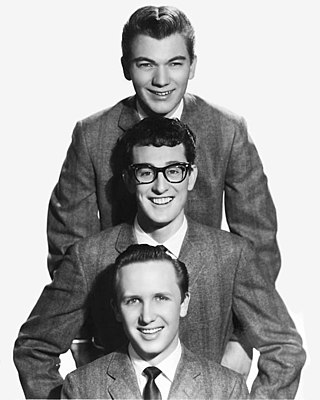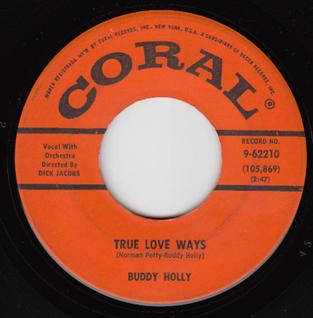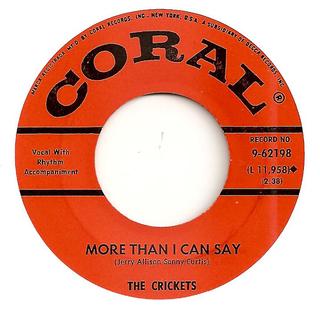
Charles Hardin Holley, known as Buddy Holly, was an American singer and songwriter who was a central and pioneering figure of mid-1950s rock and roll. He was born to a musical family in Lubbock, Texas, during the Great Depression, and learned to play guitar and sing alongside his siblings. Holly's style was influenced by gospel music, country music, and rhythm and blues acts, which he performed in Lubbock with his friends from high school.

The Crickets were an American rock and roll band from Lubbock, Texas, formed by singer-songwriter Buddy Holly in January 1957. Their first hit record, "That'll Be the Day", released in May 1957, peaked at number three on the Billboard Top 100 chart on September 16, 1957. The sleeve of their first album, The "Chirping" Crickets, shows the band line-up at the time: Holly on lead vocals and lead guitar, Niki Sullivan on rhythm guitar, Jerry Allison on drums, and Joe B. Mauldin on bass. The Crickets helped set the template for subsequent rock bands, such as the Beatles, with their guitar-bass-drums line-up, performing their own material. After Holly's death in 1959, the band continued to tour and record into the 1960s and beyond with other band members through to the 21st century.

"That'll Be the Day" is a song written by Buddy Holly and Jerry Allison. It was first recorded by Buddy Holly and the Three Tunes in 1956 and was re-recorded in 1957 by Holly and his new band, the Crickets. The 1957 recording achieved widespread success. Holly's producer, Norman Petty, was credited as a co-writer, although he did not contribute to the composition.

The Hollies are an English rock and pop band formed in 1962. One of the leading British groups of the 1960s and into the mid-1970s, they are known for their distinctive three-part vocal harmony style. Allan Clarke and Graham Nash founded the band as a Merseybeat-type group in Manchester, although some of the band members came from towns further north, in east Lancashire. Nash left the group in 1968 to form Crosby, Stills & Nash, though he has reunited with the Hollies on occasion.

"Not Fade Away" is a song credited to Buddy Holly and Norman Petty and first recorded by Holly and his band, the Crickets.

Jerry Ivan Allison was an American musician. He was best known as the drummer for the Crickets and co-writer of their hits "That'll Be the Day" and "Peggy Sue", recorded with Buddy Holly. His only solo chart entry on the Billboard Hot 100 was "Real Wild Child", issued in 1958 under the name Ivan. Allison was inducted into the Rock and Roll Hall of Fame in 2012.

The Clovers are an American rhythm and blues/doo-wop vocal group who became one of the biggest selling acts of the 1950s. They had a top 30 US hit in 1959 with the Leiber and Stoller song "Love Potion No. 9".

"Rave On", also written "Rave On!", is a song written by Sonny West, Bill Tilghman and Norman Petty in 1958. It was first recorded by West for Atlantic Records, which released his version in February 1958. Buddy Holly recorded the song later the same year, and his version became a hit, one of six of his recordings that charted in 1958. Holly is instantly recognizable as the artist: the record begins with a drawn-out "Well…" as stylized by Holly's distinctive hiccup ("A-weh-uh-heh-uh-ell…").
Sonny Curtis is an American singer and songwriter. Known for his collaborations with Buddy Holly, he was a member of the Crickets and continued with the band after Holly's death. Curtis's best known compositions include "Walk Right Back", a major hit in 1961 for the Everly Brothers; "I Fought the Law", notably covered by the Bobby Fuller Four and the Clash; and "Love is All Around," the theme song for The Mary Tyler Moore Show.

Buddy Holly is the debut studio album by Buddy Holly. It was released by Coral Records on February 20, 1958. The album, featuring a rare photo of Holly without his trademark glasses on the front cover, collects Holly's four hit singles released on the Coral label; "Words of Love", "Peggy Sue", "I'm Gonna Love You Too", and "Rave On!". The backing group was Buddy Holly's band, the Crickets.

"Heartbeat" is a rockabilly song originally recorded by Bob Montgomery and credited to Norman Petty. It was recorded most famously by Buddy Holly in 1958. The B-side of the single was "Well... All Right". "Heartbeat" reached the UK top 10 twice: once in 1975 for Showaddywaddy at number seven and again in 1992 for Nick Berry, recorded as the theme to the television series Heartbeat, which reached number two.

"Oh, Boy!" is a song written by Sonny West, Bill Tilghman and Norman Petty. The song was included on the album The "Chirping" Crickets and was also released as the A-side of a single, with "Not Fade Away" as the B-side. The song peaked at number 10 on the US charts, number 3 on the UK charts in early 1958, and number 26 in Canada.
"One Mint Julep" is a R&B song, written and composed by Rudy Toombs, that became a 1952 hit for the Clovers. The song has received over 100 cover versions, both with lyrics and as an instrumental.

"True Love Ways" is a song attributed to Norman Petty and Buddy Holly. Buddy Holly's original was recorded with the Dick Jacobs Orchestra in October 1958, four months before the singer's death. It was first released on the posthumous album The Buddy Holly Story, Vol. 2, in March 1960. The song was first released as a single in Britain in May 1960, reaching number 25 on the UK Singles Chart. It was released the following month in the US, but did not make the charts. In 1988, a UK re-release of the recording by MCA, the single reached no. 65 on the UK singles chart in a 5 week chart run.
"Sheila" is a song written and recorded by Tommy Roe. The single reached number one on the U.S. Billboard Hot 100 on September 1, 1962, remaining in the top position for two weeks and peaking at number six on the US Billboard R&B chart.
"Lovey Dovey" is a popular American rhythm and blues song originating in the 1950s and written by Eddie Curtis and Ahmet Ertegun, with the latter usually credited using his songwriter's pseudonym "Nugetre". The song's initial recording by The Clovers remains the best known version, reaching No. 2 for five weeks on the R&B charts in 1954.
Paul Winley Records Inc. was a doo-wop record label founded in 1956 that, in 1979, became one of the earliest hip hop labels. It was situated on 125th Street, Harlem, New York City. Winley released doo-wop by The Paragons and The Jesters, and hip hop records by Paul Winley's daughters, Tanya and Paulette, produced by Winley's wife, Ann. The label can lay claim to a number of firsts: one of the earliest rock and roll compilations, one of the earliest breaks compilations, an early solo female rap artist and an early instance of social commentary in rap. Winley was also the first label to record one of hip hop's most important figures, Afrika Bambaataa.

"More Than I Can Say" is a song written by Sonny Curtis and Jerry Allison, both former members of Buddy Holly's band the Crickets. They recorded it in 1959 soon after Holly's death and released it in 1960. Their original version hit No. 42 on British Record Retailer Chart in 1960. It has been notably performed by singers Bobby Vee and Leo Sayer.

"Love's Made a Fool of You" is a song co-written and originally performed by Buddy Holly. It was later re-recorded by Sonny Curtis and the Crickets, with the lead vocal by Earl Sinks, and famously covered by the Bobby Fuller Four.

In Style With the Crickets is a rock and roll album by the Crickets. Although it was the band's first release following the departure and subsequent death of their front man, Buddy Holly, it still contains many of the band's most memorable songs and many tracks have also been featured on numerous compilations over the years. Originally released as an LP record on December 5, 1960, the album remained out of print for some time until it was re-released on CD in 1993, with bonus tracks not featured on the original album.













